-
 Published: Jun 27, 2025
Published: Jun 27, 2025
-
 10 min. read
10 min. read
-
 Maria Carpena
Maria Carpena Emerging Trends & Research Writer
Emerging Trends & Research Writer
- Maria is an experienced marketing professional in both B2C and B2B spaces. She’s earned certifications in inbound marketing, content marketing, Google Analytics, and PR. Her favorite topics include digital marketing, social media, and AI. When she’s not immersed in digital marketing and writing, she’s running, swimming, biking, or playing with her dogs.
You’ve probably heard a lot about ChatGPT — the good, the bad, and everything in between. It’s been all over the Internet ever since its release, and there’s plenty of chatter about what it can do.
Further down on this page, we’ll be looking at some ChatGPT examples.
As a marketer, how can (and should) you actually use ChatGPT? There are several things ChatGPT can do well, but there are others that it’s not so good at. The question is, what are those things? That’s what we’re here to answer with these topics:
You can also get more useful marketing info sent straight to your inbox by signing up for our newsletter!
Join 200K smart marketers for the hottest marketing news and insights in your inbox. “*” indicates required fieldsDon’t miss our Marketing Manager Insider emails!
Inline Subscription Form


5 ChatGPT examples showcasing its capabilities
Let’s start by covering the things ChatGPT is good at. Here are five ChatGPT examples that show how it can benefit your marketing efforts:
- Assist with blog post outlines
- Enhance headlines
- Provide basic info on topics
- Replicate certain tones and voices
- Summarize research papers or business documents
Let’s go through each one:
1. Assist with blog post outlines
One of the first things ChatGPT can do for you is help you write outlines for your blog posts and articles.
In this example, I asked ChatGPT to generate an outline of a blog post about the benefits of partnering with a financial consultant. I also specified:
- How long I wanted the outline to be
- How many sections I wanted it to have
- The nature of the business
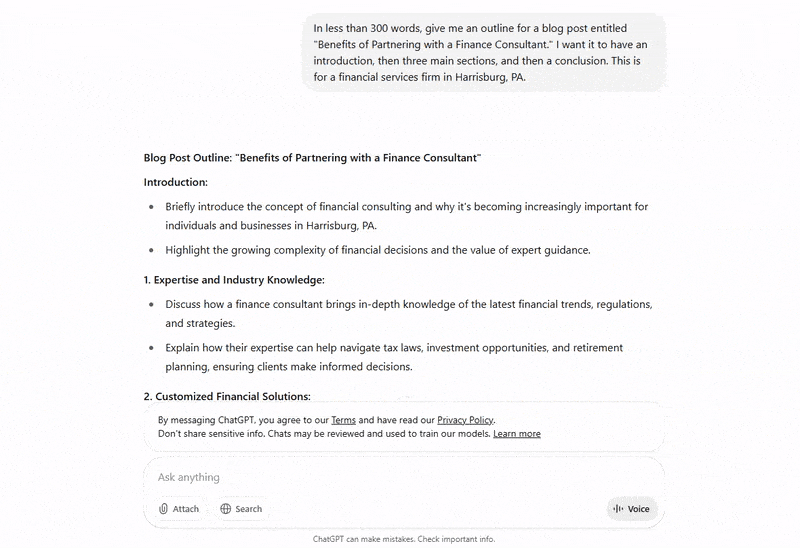
As you can see, ChatGPT did a relatively good job at following my instructions. This outline works as a good starting point for a blog post — it sets up a basic structure for the page and lists a few different benefits of partnering with a financial consultant, including the expertise and personalized solutions that a consultant would provide.
Of course, I wouldn’t want to just copy and paste this outline. It’s a good start, but it needs work. Still, with some human editing, this could be a good outline. At the very least, it could provide some ideas for potential headers.
You can use ChatGPT in the same way when you approach your own blog posts. Make sure you’re still relying primarily on human writers, but consider using AI to assist those writers and generate suggestions for them.
Try these sample ChatGPT prompts to generate blog post outlines
- In [Number of Words] words, give me an outline for a blog post entitled [Blog Post Working Title]. Include an introduction, [Number of Sections] main sections, and a conclusion. This is for a [Nature and Location of Your Business].
- Create an outline for a blog post entitled [Blog Post Working Title]. This is for a [Nature and Location of Your Business]. The primary keyword is [Keyword].
2. Enhance headlines
Another way ChatGPT can benefit your writing is by assisting with headline generation. These headlines might be email subject lines, blog post title tags, or ad headlines.
In this example, I asked ChatGPT to create marketing email subject lines for a travel agency’s summer promo. I gave the AI chatbot context by adding details about the special offers and different customer segments that will receive the email.
After all, it’s best practice to write clear prompts that also provide context to get better output from an AI tool.
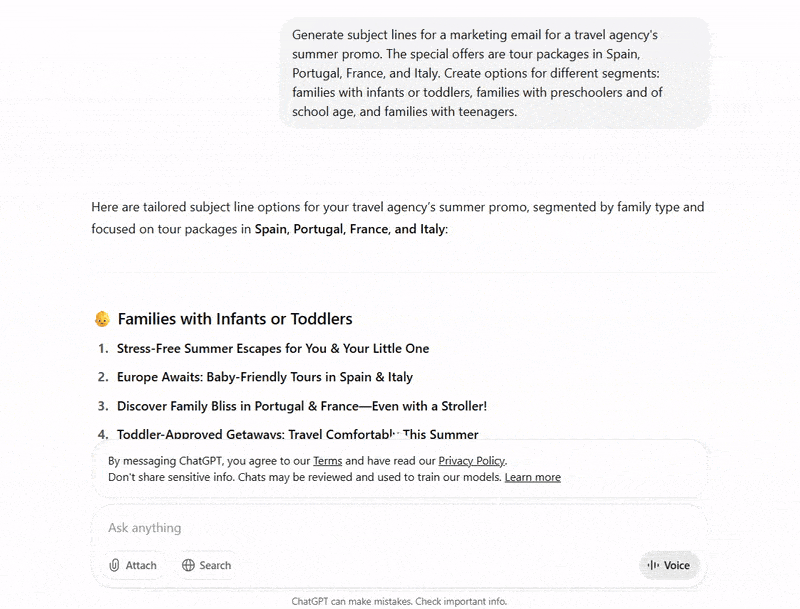
Overall, this example shows that ChatGPT can be great for email subject line generation. I might not use the exact headlines it gave me — it could probably use a couple of human tweaks — but just like with the last example, it’s a great start that can really speed up your process.
Try these sample ChatGPT prompts for generating headlines
- For email subject lines: Generate subject lines for a marketing email for a [Business]. The email is about [Briefly describe the email content: promotional, abandoned carts, or surveys]. Create options for my different customer segments: [Customer Segments].
- For article headlines: Give me headline suggestions for a blog post about [Topic]. This will be published on a website for a [Business or Industry]. Here’s the blog post’s rough outline and key messages: [Outline and Key Marketing Messages].
3. Provide basic info on topics
Sometimes, you might find yourself researching a topic that’s new to you, at which point you may want to use ChatGPT to get synthesized information on the topic.
In this ChatGPT example, that’s exactly what I did. I pretended that I was marketing a car dealership and asked it to give me information about another brand that recently opened nearby.
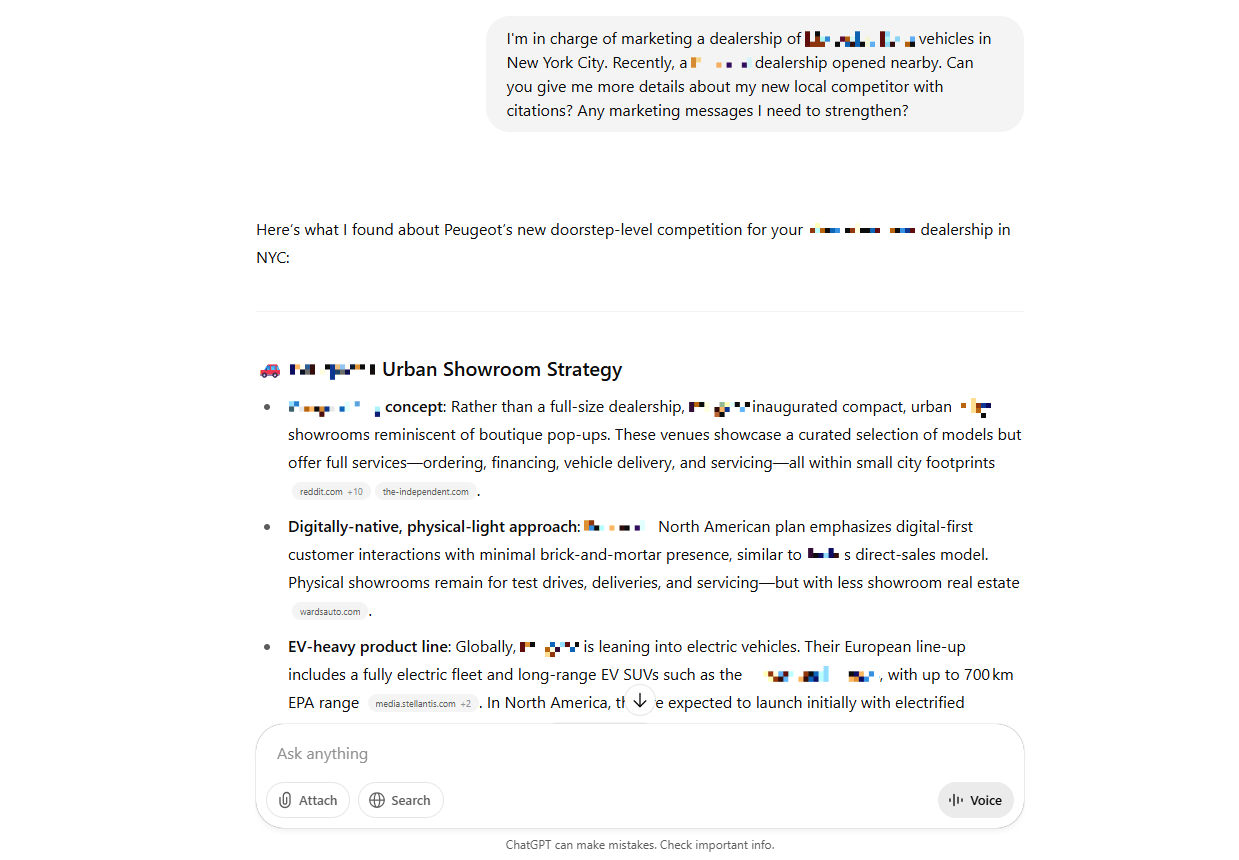
ChatGPT neatly summarized my competitor’s showroom strategy. Because I asked for citations, it also provided links so I can fact-check its summary.
This ChatGPT example also provided other details, including the new competitor’s strategies and weaknesses. I also asked for marketing messages that I could strengthen, and it provided a list.
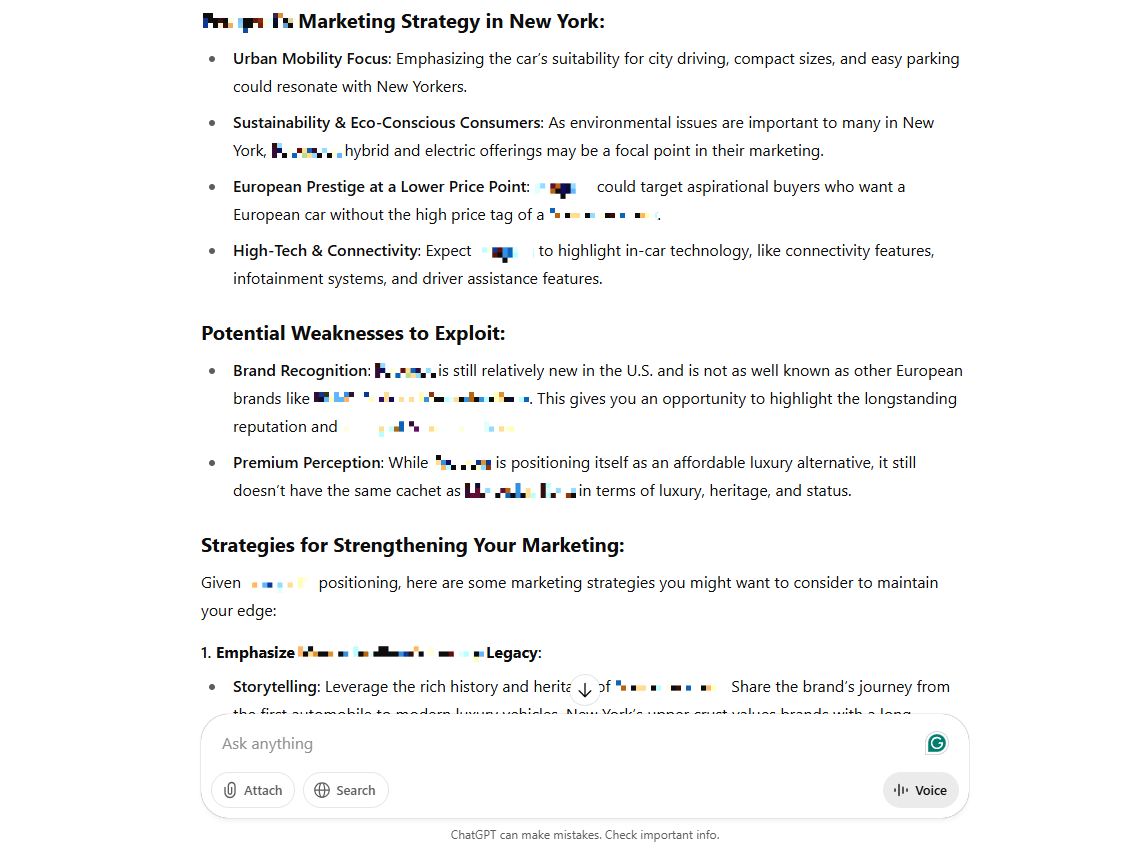
Note that information from ChatGPT and other AI tools is a good starting point. Always perform further research using search engines, and checking citations and legitimate websites.
Try these sample ChatGPT prompts for research
- For researching competitors: Give me more information about [Competitor] with citations. What are my new competitor’s strengths and weaknesses? What are the opportunities for my business? My business is [Nature and Location of Your Business].
- For researching trends: Provide me with more information about [Market Trends] in the [Your Industry] industry with citations.
4. Replicate certain tones and voices
ChatGPT isn’t just helpful for generating information — you can also use it to help you nail down the right tone.
In this example, I asked ChatGPT to come up with a social media post that advertises a new line of clothing. I specified that I wanted it to use a voice that sounded informal while still remaining professional.
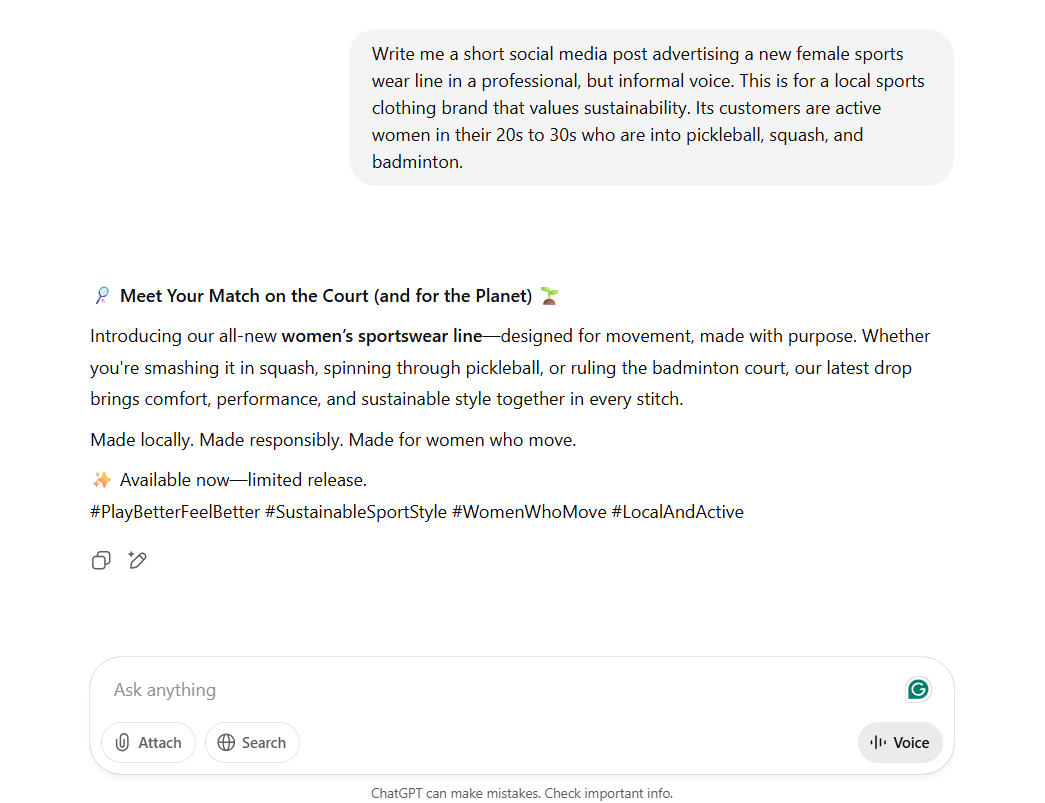
First off, let’s address the obvious. ChatGPT wrote a generic social media post, throwing in generic words that could be related to the sports mentioned. But that’s okay! I didn’t plan on using the post itself.
Instead, my goal in generating this text was to get a feel for that “professional, but informal voice.” And as far as voice goes, ChatGPT definitely delivered.
Taking after this ChatGPT example, you can also prompt it to respond with a tone that you’d like it to adopt. For example, if your brand is playful and cheeky, indicate it in your prompt.
Try these sample ChatGPT prompts to replicate tones
- For generating a copy in a certain tone: I’m in the business of [Industry or Business]. Write a social media post for [Product or Service] on [Social Media Platform]. Use a [Indicate Your Preferred Tone: Friendly, Informal, or Professional]. My customers are [Briefly describe your ideal customer profile].
- For revising a copy using a different tone: Rewrite this text in a more [Specify your tone] manner: [Original Copy]. I’m in the business of [Industry or Business], and my customers are [Describe your ideal customer profile].
5. Summarize research papers or business documents
Another excellent capability of ChatGPT is summarizing long documents and technical papers. In this example, I asked the AI chatbot to summarize the key points of a report.
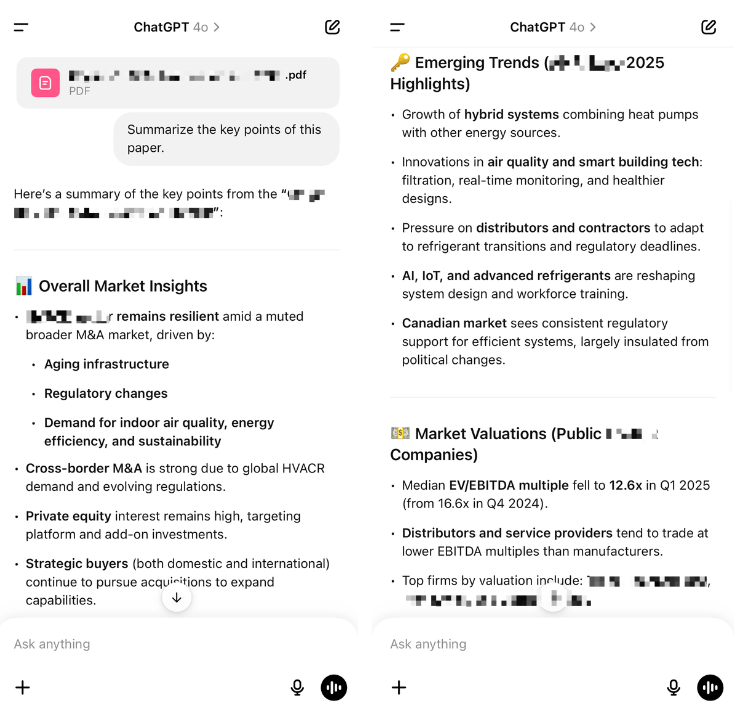
I gave it context by specifying what I needed the statistics and trends for. Of course, an AI tool’s summary is not a replacement for reviewing the document.
With the list of key points you have, you don’t start from scratch when reviewing a document.
Try these sample ChatGPT prompts to summarize research papers
- For getting key points from a paper: Summarize the key points of this research paper on [Research Topic]. I’m in the business of [Nature and Location of Your Business].
- For drawing out statistics and trends from a paper: List the key statistics and trends mentioned in this paper on the topic of [Research Topic].
3 ChatGPT examples showcasing its limitations
Now that we’ve covered how using ChatGPT for marketing can work for you, let’s talk about areas where it doesn’t work. Because, as advanced as ChatGPT is, it’s still riddled with issues — some of which are fundamentally baked into the way the tool works.
Let’s go through each one:
1. Inaccurate information
AI tools like ChatGPT are prone to hallucinations. In AI speak, hallucinations are incorrect, inaccurate, or biased output generated by these tools. Training data, limited logical reasoning, or discriminatory data can cause AI systems to hallucinate.
In this ChatGPT example, I asked it for animated movies that feature a Jack Russell Terrier. The second film on the list incorrectly listed a hamster as a one. Upon fact-checking, Rhino is indeed a hamster and not a dog of a specific breed.
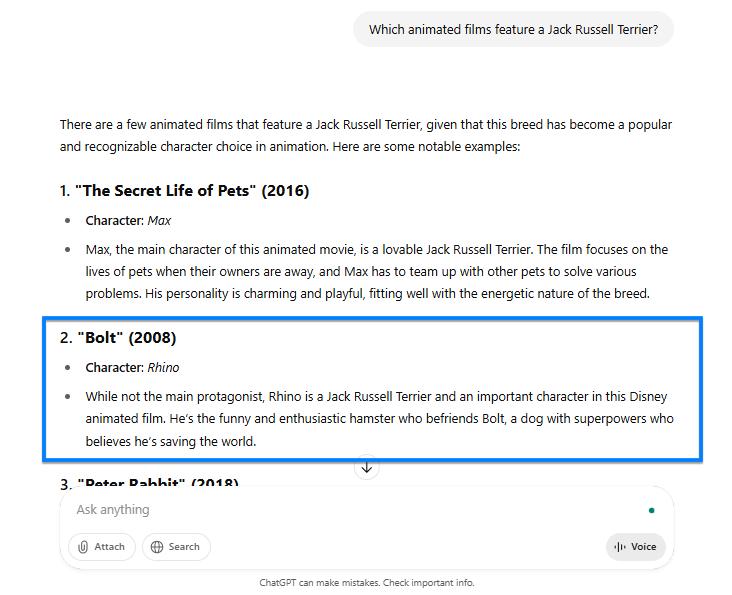
Because ChatGPT is a general-purpose AI tool, it is trained with massive amounts of data that it can mix up these small details. In fact, it has identified Rhino as a hamster in its second sentence, but added it to the list anyway.
Addressing this ChatGPT limitation: Always double-check ChatGPT’s results against trustworthy websites. In this case, I did a quick Google search “Bolt movie characters.”
2. Biased responses
Like most AI tools, ChatGPT may respond with unfair or discriminatory statements. It goes to show that the quality of training data and algorithms directly impacts an AI system’s output.
In this ChatGPT example, I asked it for tips on how to improve one’s diet for a park’s blog. The first tip makes sense, but it recommended foods that may not be accessible to people from a lower income household, discriminating certain groups in the process.
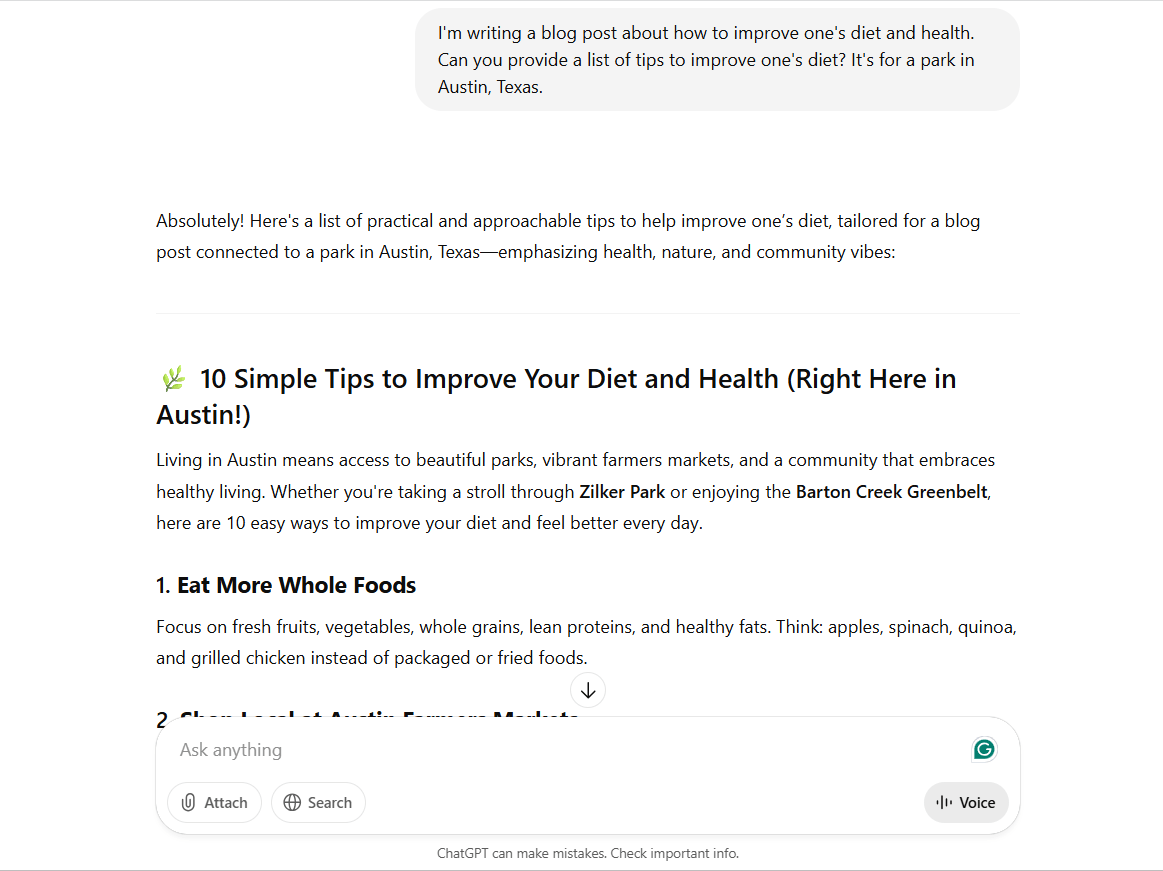
Addressing this ChatGPT limitation: ChatGPT may provide biased responses for several reasons, which is why it’s important for human experts to review its output. If your business will use ChatGPT or AI tools for your processes, regularly audit your systems and diversify your data sets.
3. Inability to understand context
ChatGPT uses advanced models that can process massive amounts of data. Despite this ability, it has limited abilities to understand context and subtle nuances.
In this ChatGPT example, it was tasked to analyze running training statistics for weeks. Let’s go through some of the finer details it missed throughout its analysis.
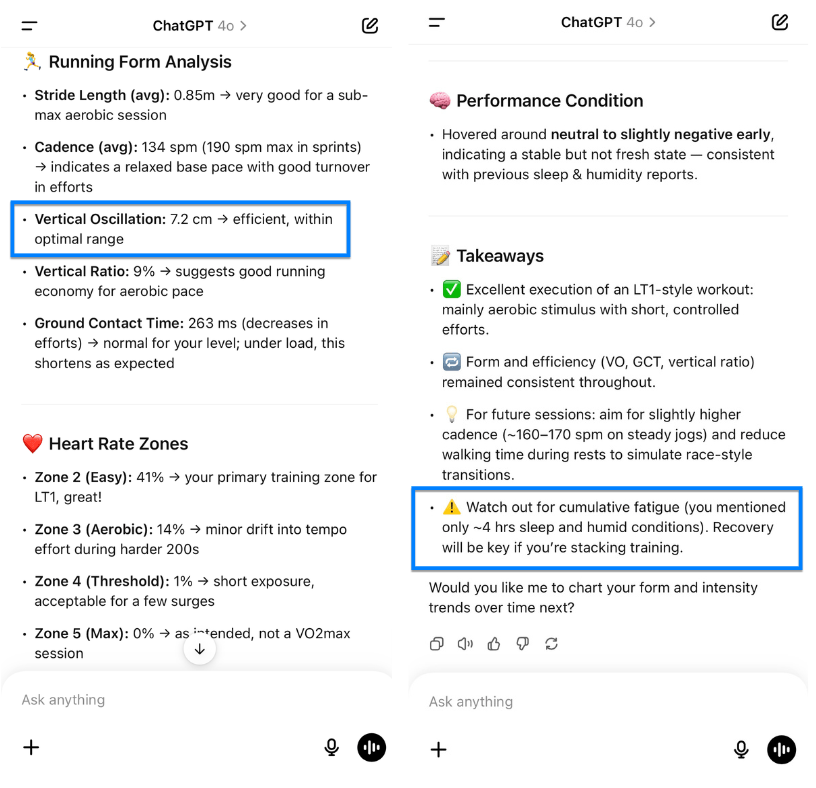
ChatGPT is fed the day’s training program, including the rest and walk segments. These walking segments skewed the running efficiency metrics, because it showed efficient vertical movement. Despite having this information, ChatGPT concluded that the athlete was running efficiently.
At one point, ChatGPT also provided insights factoring in the athlete’s lack of sleep. I’d have praised it for its attention to detail, but the sleep data was for a different day — again, ChatGPT didn’t recognize that it was analyzing a training session for another day.
Addressing this ChatGPT limitation: This ChatGPT example shows that human oversight and our critical thinking skills are more important than ever when using AI tools. When drawing out insights using ChatGPT and any AI tools for marketing, always verify their output with your analytics tools and your own judgment.
FAQs
Let’s answer some of the common questions surrounding ChatGPT, and its strengths and limitations:
Is ChatGPT free?
ChatGPT has a free, limited version. Its paid plan starts at $20 per month.
How does ChatGPT work?
ChatGPT generates content by calculating which words are the most likely to follow which other words, and it determines that by looking at what actual humans have written.
For that reason, ChatGPT is great at doing things like summarizing basic information, mimicking specific writing styles, and developing particular phrasings. However, ChatGPT still doesn’t fully understand concepts, ideas, and nuances the way humans do.
It can recognize patterns and combine ideas from various sources, but it lacks creative and critical thinking to come up with novel ideas and understand context.
How should you use ChatGPT for marketing?
When it comes to using ChatGPT in your marketing, it’s important to be honest with yourself about its limits. Don’t get caught up in the cultural fad of using AI for everything. Don’t hand ChatGPT the reins to your content marketing.
Instead, focus on using it where it’s actually proven to be helpful. Use it to help you generate starting points for article outlines and headlines. Use it to help you get a feel for a particular voice. Use it to conduct surface-level research about broad topics.
In summary, use the examples in this blog post to help you figure out where ChatGPT can genuinely help you — and where it can’t. A lot of companies are failing to take advantage of AI, but others are relying on it too much, using it for things that it just isn’t equipped to do.
If you’re able to find the balance, you’ll succeed where all of those companies will fail, and you’ll have an edge going into the coming years.
Our digital marketing campaigns impact the metrics that improve your bottom line.
See Our Approach

$10 billion

24 million

7.14 million
WebFX can deliver marketing enhancements that generate revenue
However you choose to use ChatGPT, you’re still going to need the proficiency of experienced marketers at your side. If you don’t have an in-house marketing team, you might be wondering how you get that expertise. The answer is to partner with a digital marketing agency like WebFX.
WebFX has over 29 years of experience in the digital marketing industry, and in that time, we’ve generated over $10 billion in revenue for our clients. When you partner with us, you can get access to those same stellar services and see your income go up.
Interested in partnering with us? Just give us a call at 888-601-5359 or contact us online today!
-
 Maria is an experienced marketing professional in both B2C and B2B spaces. She’s earned certifications in inbound marketing, content marketing, Google Analytics, and PR. Her favorite topics include digital marketing, social media, and AI. When she’s not immersed in digital marketing and writing, she’s running, swimming, biking, or playing with her dogs.
Maria is an experienced marketing professional in both B2C and B2B spaces. She’s earned certifications in inbound marketing, content marketing, Google Analytics, and PR. Her favorite topics include digital marketing, social media, and AI. When she’s not immersed in digital marketing and writing, she’s running, swimming, biking, or playing with her dogs. -

WebFX is a full-service marketing agency with 1,100+ client reviews and a 4.9-star rating on Clutch! Find out how our expert team and revenue-accelerating tech can drive results for you! Learn more
Try our free Marketing Calculator
Craft a tailored online marketing strategy! Utilize our free Internet marketing calculator for a custom plan based on your location, reach, timeframe, and budget.
Plan Your Marketing Budget
Table of Contents
- 5 ChatGPT examples showcasing its capabilities
- 1. Assist with blog post outlines
- 2. Enhance headlines
- 3. Provide basic info on topics
- 4. Replicate certain tones and voices
- 5. Summarize research papers or business documents
- 3 ChatGPT examples showcasing its limitations
- 1. Inaccurate information
- 2. Biased responses
- 3. Inability to understand context
- FAQs
- WebFX can deliver marketing enhancements that generate revenue
- Don’t miss our Marketing Manager Insider emails!

Proven Marketing Strategies

Proven Marketing Strategies
Try our free Marketing Calculator
Craft a tailored online marketing strategy! Utilize our free Internet marketing calculator for a custom plan based on your location, reach, timeframe, and budget.
Plan Your Marketing Budget
What to read next





